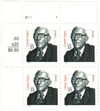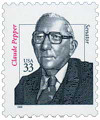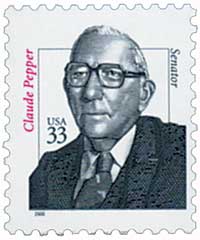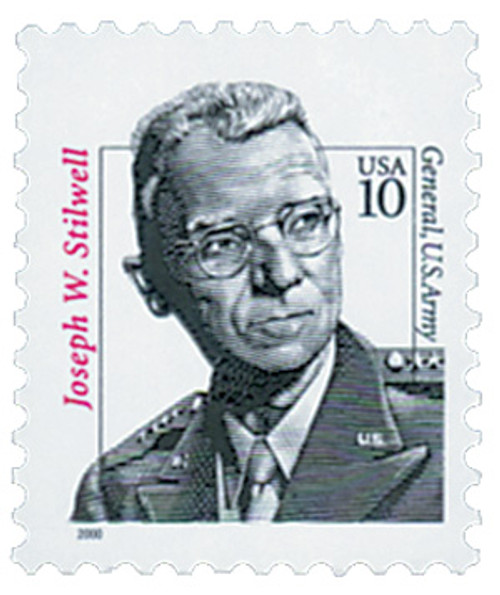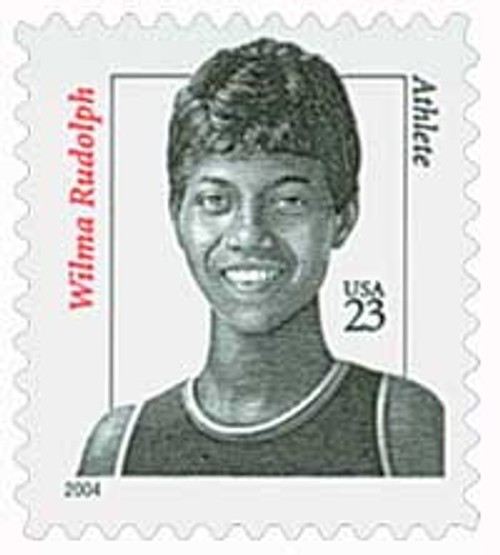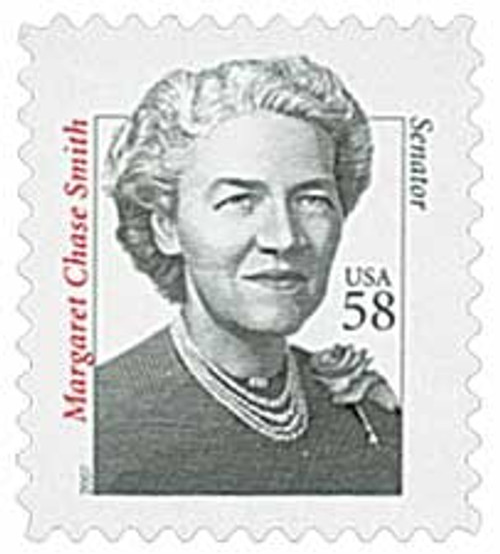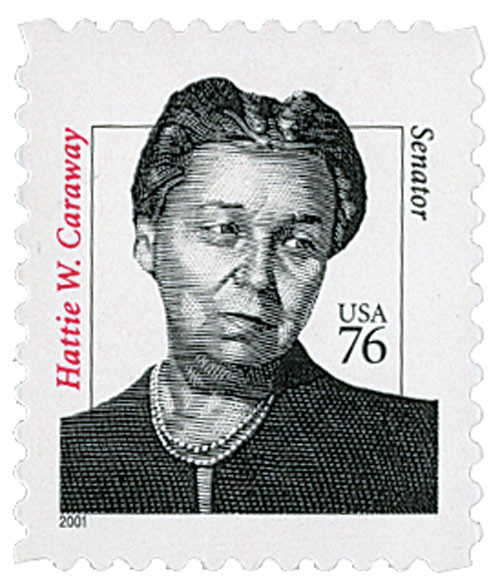
# 3426 - 2000 33c Distinguished Americans: Claude Pepper
33¢ Claude Pepper
Distinguished Americans Series
City: Washington, DC
Printed by: Banknote Corporation of America
Printing Method: Lithographed and engraved
Perforations: 11
Color: Red and black
Happy Birthday Claude Pepper
After graduating from high school, Pepper had several different jobs. He ran a hat cleaning and repair business and was a teacher. He even worked in a steel mill before finally going to the University of Alabama. Pepper joined the Student Army Training Corps during World War I, but didn’t see service. He went on to graduate from the University of Alabama in 1921, and then from Harvard Law in 1924.
Pepper then taught law at the University of Arkansas before opening a law practice in Perry, Florida. He was elected to the Florida House of Representatives in 1928, serving for one term. He then moved to Tallahassee and served on the Florida Board of Public Welfare and as a member of the Florida Board of Bar Examiners.
Pepper was then elected to the US Senate in 1936. In that role, he supported Franklin Roosevelt’s New Deal and was a close ally of the president. Pepper supported the Fair Labor Standards Act of 1938 and was a driving force behind the passage of the Lend-Lease Act. He also filibustered an anti-lynching bill in 1937. He failed to win re-election in 1950, in part over his outspoken support of the Soviet Union, which he believed was moving toward democracy.

Pepper returned to practicing law before being elected to the US House of Representatives in 1962. He was one of a small number of modern politicians to serve in the House after a career in the Senate. He spent the rest of his career in the House, eventually becoming chair of the Rules Committee in 1983. He opposed Fidel Castro and supported aiding the Nicaraguan Contras. Pepper also voted in favor of the Civil Rights Acts of 1968 and 1968 and the Voting Rights Act of 1965.

In the 1970s, Pepper served on the Joint House-Senate Committee on Crime. Then in 1977 he was made chair of the new House Select Committee on Aging. In that role, he was the nation’s leading spokesman for the elderly. He supported Social Security programs, strengthened Medicare, and launched a four-year investigation into health care scams that targeted the elderly. Pepper also led a 1986 action that ended mandatory retirement in the federal government.
Pepper co-authored the legislation creating the National Cancer Institute, and sponsored bills calling for equal pay for women as well as minimum wages. Additionally, in 1988 he sponsored a bill to create the National Center for Biotechnology Information.

In 1989, Pepper received the Medal of Freedom, the nation’s top civilian award, four days before his death on May 30, 1989. During his life, he had been on the cover of Time twice and received the Award for Greatest Public Service Benefiting the Disadvantaged and the Roosevelt Institute’s Four Freedoms Medal. Several places in Florida are also named in his honor, including the federal building in Miami and a highway.
33¢ Claude Pepper
Distinguished Americans Series
City: Washington, DC
Printed by: Banknote Corporation of America
Printing Method: Lithographed and engraved
Perforations: 11
Color: Red and black
Happy Birthday Claude Pepper
After graduating from high school, Pepper had several different jobs. He ran a hat cleaning and repair business and was a teacher. He even worked in a steel mill before finally going to the University of Alabama. Pepper joined the Student Army Training Corps during World War I, but didn’t see service. He went on to graduate from the University of Alabama in 1921, and then from Harvard Law in 1924.
Pepper then taught law at the University of Arkansas before opening a law practice in Perry, Florida. He was elected to the Florida House of Representatives in 1928, serving for one term. He then moved to Tallahassee and served on the Florida Board of Public Welfare and as a member of the Florida Board of Bar Examiners.
Pepper was then elected to the US Senate in 1936. In that role, he supported Franklin Roosevelt’s New Deal and was a close ally of the president. Pepper supported the Fair Labor Standards Act of 1938 and was a driving force behind the passage of the Lend-Lease Act. He also filibustered an anti-lynching bill in 1937. He failed to win re-election in 1950, in part over his outspoken support of the Soviet Union, which he believed was moving toward democracy.

Pepper returned to practicing law before being elected to the US House of Representatives in 1962. He was one of a small number of modern politicians to serve in the House after a career in the Senate. He spent the rest of his career in the House, eventually becoming chair of the Rules Committee in 1983. He opposed Fidel Castro and supported aiding the Nicaraguan Contras. Pepper also voted in favor of the Civil Rights Acts of 1968 and 1968 and the Voting Rights Act of 1965.

In the 1970s, Pepper served on the Joint House-Senate Committee on Crime. Then in 1977 he was made chair of the new House Select Committee on Aging. In that role, he was the nation’s leading spokesman for the elderly. He supported Social Security programs, strengthened Medicare, and launched a four-year investigation into health care scams that targeted the elderly. Pepper also led a 1986 action that ended mandatory retirement in the federal government.
Pepper co-authored the legislation creating the National Cancer Institute, and sponsored bills calling for equal pay for women as well as minimum wages. Additionally, in 1988 he sponsored a bill to create the National Center for Biotechnology Information.

In 1989, Pepper received the Medal of Freedom, the nation’s top civilian award, four days before his death on May 30, 1989. During his life, he had been on the cover of Time twice and received the Award for Greatest Public Service Benefiting the Disadvantaged and the Roosevelt Institute’s Four Freedoms Medal. Several places in Florida are also named in his honor, including the federal building in Miami and a highway.








